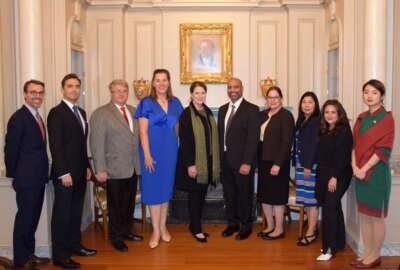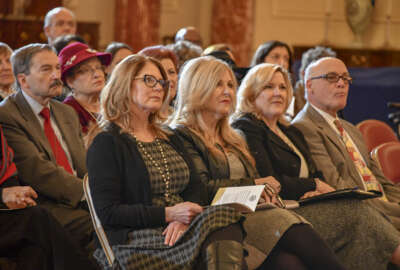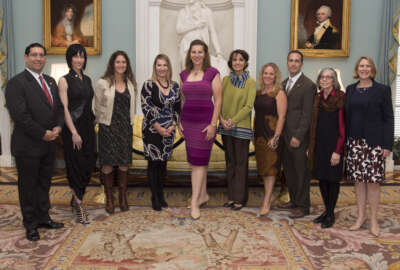
State Dept gives thanks to Foreign Service’s ‘exceptional’ volunteer workforce
The State Department promotes America’s diplomatic mission overseas, but the men and women of the Foreign Service, and the families they bring with the, put a...
The State Department promotes America’s diplomatic mission overseas, but the men and women of the Foreign Service — and the families they bring with them —put a face to that mission through off-the-clock acts of kindness.
Foreign Service officers and their families in the past year have created programs for special-needs children in Malaysia, organized triathlons in Islamabad and rescued endangered marine wildlife in Gabon.
To recognize these agency employees and eligible family members — agency shorthand for spouses and children of Foreign Service officers who travel them — the State Department has presented seven individuals with this year’s Secretary of State Award for Outstanding Volunteerism Abroad.
The awards are hosted each year by Associates of the American Foreign Service Worldwide and the Diplomatic and Consular Officers Retired.
Secretary of State Mike Pompeo, in a virtual award ceremony last Friday, said the awardees went above and beyond to give back to their communities aboard.
“Our people are exceptional because we come together freely to solve problems that help others in need,” Pompeo said.
Carol Perez, the director-general of the Foreign Service and director of human resources at the State Department, said the work of Foreign Service family members remains vital to the success of the organization and a “resource that we would be wise to leverage.”
“The 2020 awardees, honorable mentions and nominees represent the best of our Foreign Service family,” Perez said. “And in this most difficult year, I could think of nothing better to celebrate.”
How to ‘hit the ground running’ with volunteer work
Jane Thompson, an EFM who has traveled with her Foreign Service spouse since the mid-1990s, received a SOSA award for creating programs for special-needs children at schools in Kuala Lumpur, Malaysia — her sixth overseas post.
Thompson said in an interview that this volunteer work made sense to her, because she works as an early intervention specialist for children with special needs when she’s back in the United States. Right now, she works as the director for the Montgomery County infant-toddler program with the Lourie Center for Children’s Social & Emotional Wellness in Rockland, Maryland.
Thomson said that as an early intervention specialist, it’s always been easy to find opportunities to use her skills wherever she is.
“What I have learned is to try to hit the ground running when you get to a new post — to look around, talk to people, find out what the needs are, and get involved in it,” Thompson said. “At the end of that tour, I’m always much happier if I’ve been able to look and say I’ve made a difference, [that] I’ve started something I can pass it on to others.”
Much like military spouses, eligible family members can run into challenges finding formal employment at their new posts. However, Thompson said EFMs often find ways to apply their skills and passions through projects when they arrive at a new post.
“EFMs are the greatest skilled volunteer workforce in the world, but we have to make a decision along the way to put our ego and usually our professional trajectory on the shelf — and I don’t regret that,” she said.
Thompson and her spouse have raised three children under the Foreign Service lifestyle, but said all of them are glad they grew up the way they did. However, it’s a way of life that certainly has its challenges.
Thompson recalled hectic first days becoming reacquainted with everyday tasks, like figuring out how to dial out on the phone, hail a taxi or find the nearest grocery store. Meanwhile, her family has gone through the gamut of tropical diseases.
“I remember one time within a month period, we had scabies, lice, Shigella and amoebic dysentery,” Thompson said. “And this year started with a bout of Dengue fever for our family.”
Thompson said the Foreign Service life isn’t always easy and no matter how many times she moves, the culture shock continues.
“You have to adjust, you have to go through it, you have to recreate your life. And we’ve become more resilient by doing it. I certainly don’t want to make it sound like it’s not something families shouldn’t do, because I wouldn’t give it up.”
Thinking ‘outside the box’ in the Foreign Service
Foreign Service Officer Moises Mendoza received a SOSA award in part for developing an add-on to Google Maps that helped embassy personnel stay out of violent “red zones” in Matamoros, Mexico and that would provide directions on how to return to the safety of the green zone.
In addition, Mendoza worked with the University of Texas Rio Grande Valley to research the history of the 200-year old consulate at Matamoros through primary records that survived through the centuries.
Through this research, Mendoza said he found incredible stories of combat and courage that date back to the early 20th and late 19th centuries. He also learned of an officer who had died under heroic circumstances whose name will go on the State Department’s memorial wall, which lists the names of all of its fallen employees.
In addition, Mendoza became an emergency medical technician by taking night classes and began teaching CPR at the post, because they had no medical unit.
“Once you’re good at your job, you should look for niches and ways to make a difference and think outside the box,” Mendoza said. “And that’s really what I was trying to do. I was trying to look for ways that I could add value to my post and add value to my community that went beyond just my nine-to-five job.”
‘Showcasing America’ through good deeds
Michelle Collette, an EFM, received a SOSA award for organizing a group of volunteers to patrol the beaches of Libreville, Gabon every day during the nesting season for endangered sea turtles, and worked with the community to organize trash cleanups on the beach.
Collett said she stumbled into this volunteer work, having discovered sea turtle eggs on a beach while taking part in beach clean-up. The beaches of Libreville are close to the city, and in this particular section of an estuary, many Gabonese assumed city pollution had driven the sea turtles away.
Collett also received the J. Kirby Simon Foreign Service Trust grant to construct a well, bathrooms and water storage for an orphanage and children’s shelter. In her three years in Gabon, Collett volunteered as a soccer coach, music instructor, choir director and drama teacher.
In addition to giving back to her community, Collett said the volunteer work of Foreign Service families carries extra weight in countries where many of the locals have never met an American before.
“You will meet many people who’ve never met one before, and so it’s an interesting reminder to have in the back of your head, that even though I’m not the officer or the official person with the U.S. embassy working a job there, I am showcasing America just by the sheer fact of being American in a different country where I am a guest,” Collette said.
Copyright © 2024 Federal News Network. All rights reserved. This website is not intended for users located within the European Economic Area.
Jory Heckman is a reporter at Federal News Network covering U.S. Postal Service, IRS, big data and technology issues.
Follow @jheckmanWFED





